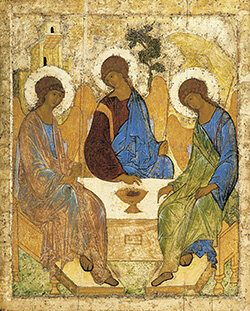On a crisp Autumn night a few years ago, our little church started a new institution in the life of our community: monthly neighborhood parties. In the months leading up to that night, we had built a beautiful relationship with our local jazz club, who agreed to host us. We spent weeks of valuable staff time making preparations. Our ministry coordinator rallied church members to decorate the venue, nail down logistics, and spread the word throughout our neighborhood. My musically gifted assistant pastor made arrangements for our live band to perform. And in the days leading up to the party, I conducted my priestly ministry by laying brisket, pork, and chicken on the holy barbecue altar so that we could feed the sheep.
As I sat by my cooker, carefully tending the fire, I watched the smoke of the holy offering ascend to the Lord. With each passing hour, my excitement for the evening grew all the more. But as I reflected on the potential significance of this new institution, an anxious thought entered my mind: “What if nobody comes and this is all a waste?” At this point, we had devoted a significant amount of money, mental bandwidth, and staff time to this event: would it all be for nothing, one big inefficient waste? The thought nagged me for the rest of that day.
When I arrived at our venue that evening, our set-up was already underway. I quickly put the barbecue in place, jumped in with the band to do a sound-check, and then we waited for the people. Just minutes before the official start time, that nagging question reemerged: “What if nobody comes and this is all a waste?” But just minutes later, my anxieties melted away as one neighbor after another sheepishly walked through the door. Before long, the place was filled with church members and neighbors from every walk of life: young and old, rich and poor, Christian and non-Christian. It was a beautiful cross-section of the ethnic, socioeconomic, and spiritual diversity of our neighborhood.
After welcoming and feeding our guests, it was time to start the music and get people on the dance floor. The band was blazing, and within minutes an infectious joy was pulsing through the crowd. They danced to Stevie Wonder and Bruno Mars, they sang along to Bob Marley and Earth, Wind & Fire, and people connected across every forbidding line of difference.
As soon as I stepped down from the stage for the band’s short break, a middle-aged African American man pulled me aside and, with a look of absolute puzzlement, said to me, “So let me get this straight, this is a church throwing this party?”
I replied, “Yes, we’re right here in the neighborhood.”
And then, with an added note of incredulity, he asked, “And you’re the pastor?”
I chuckled saying, “Guilty as charged!”
As he tried to solve this mystery, he paused for a reflective moment and then continued to pursue his line of inquiry. “So you are doing this as a recruitment for the church, right?”
I answered, “Well, let me put it to you like this: if we never see a single person come through the doors of our church because of our parties, we’re still going to throw these parties to welcome our neighbors because we believe that God has welcomed us.”
He pondered that statement for a second and then asked a final question, “So how much do I owe you?”
I quickly replied, “Not a thing! Sharing in the joy of God and our neighbors is our reward.”
As he nodded in satisfaction, a cautious smile started to spread across his face and I could detect what seemed like a hint of embarrassment; it was as if he couldn’t believe that he was allowing himself to set aside his skepticism toward the church.What might it mean to live a life that is free from the inhuman demands of efficiency? At this point, the next musical set was about to begin. So I extended my hand and he gripped it and said with a smile, “I love what you all are doing here. Keep up the good work, pastor.”
In his book You Are Not Your Own, Dr. Alan Noble argues that, for modern people, “our one agreed-upon value in nearly every sphere of life tends to be efficiency” (p. 55). This commitment to efficiency may be seen in our relentless push to optimize both ourselves and our society in hopes that, somehow, we might finally lay hold of modernity’s promise of a better life. And yet, despite all our efforts, this promise continues to elude us.
What might it mean to live a life that is free from the inhuman demands of efficiency? In reflecting upon this question, Dr. Noble proposes that the alternative to efficiency is prodigality. He suggests that “we live prodigally when we act according to love or goodness or beauty rather than primarily efficiency” (p. 151). While one could quibble with this language, I believe that conceptually he is exactly right. Indeed, the press for efficiency, for all of its good intentions, has somehow diminished us and has left us exhausted and lonely. Our lives ought to be governed not by the exacting pursuit of efficiency, but by the joyful bestowal of extravagance.
One of the most beautiful and accessible expressions of prodigality is the Christian practice of hospitality. The table gives us a most profound opportunity to share the love, goodness, and beauty that have been obscured by our frantic quest to meet the demands of self-belonging. In an age when people are building higher walls, the church has the counter-cultural privilege of building longer tables, bearing witness to the hospitality of God and the age to come.One of the most beautiful and accessible expressions of prodigality is the Christian practice of hospitality. The pressures of self-making have led us to estrangement, but hospitality is a pathway that can help us to find our way back to one another. It just might be the way that our neighbors find their way back to God, or better put the means by which the Lord comes to our neighbors.
The brief conversation that I had with my neighbor on that Friday night was revealing. He wasn’t surprised that people in the city were throwing a neighborhood party. He was confounded by the idea that a church was throwing a neighborhood party with no strings attached. How could it be that the church, a body that is so identified with exclusion in popular American discourse, was now welcoming him to enjoy extravagance? I think that this was the mystery underlying his line of inquiry on that Friday night. Evidently, the last place he expected to encounter love, goodness, and beauty, the last place he expected to find joy and connection, the last place he expected to experience hospitality was at the hand of the church. He expected an efficient church that would act in self-interest, maintaining a quid pro quo relationship to the neighborhood in which events were exchanged for membership or tithes. What he encountered was a self-giving church committed to maintaining a sola gratia relationship to the neighborhood. On that night, his settled ecclesiology was beautifully disrupted by hospitality; his expectations of the church came into dissonance with his experience of the church as he enjoyed a taste of the life to come. And if we would recover our waning witness then we must not allow Christian efficiency to prevent us from becoming what Christian hospitality demands we become. Put another way, we must not allow efficiency to inadvertently subvert our ethic.

Andrei Rublev, “The Trinity”
Christian efficiency thrives in American churches precisely because it is easily adaptable to certain forms of Christian language and thinking. In the church, efficiency dresses up as “stewardship” because we don’t want to “waste” the Lord’s resources that have been put under our management. This has often led to a kind of miserliness and austerity that looks like discipline and responsibility but is more like self-preservation. Sometimes efficiency masks itself as “wisdom,” a level-headed, balanced, and pragmatic way of thinking that helps us to avoid extremes. But Scripture beckons us to imitate a God whose generosity and extravagance in creation, redemption, and consummation knows no bounds. Furthermore, Scripture teaches us that Dr. King was right when he said that “Jesus Christ was an extremist for love, truth, and goodness.”See Martin Luther King Jr., Letter From A Birmingham Jail (London: Penguin Classics, 2018). In his earthly life, Jesus did not lead his people down the “wise,” safe, centrist pathway that we so often like to take in his name. It didn’t appear to be “wise” for Jesus to commune with sinners and tax collectors. It didn’t appear to be “wise” for Jesus to welcome people to his banquet who could not return the favor. It didn’t seem “wise” for the Father to welcome his reckless son back home and to throw him a party after he wasted his entire inheritance. But Christ is so extreme in his hospitality, so extravagant in his generosity that he not only welcomes us to his table as the great host, he himself became the bread from heaven, the holy meal to nourish our hungry souls with the “richest of fare.” The hospitality of God that saved our lives is the very hospitality that should mark our lives.
The reason why Christian efficiency, when valued as an ultimate good, is so contrary to the Spirit of the Christian faith is that efficiency entails exclusion. Efficiency excludes the weak, the stragglers, the strugglers, and the despairing. It’s not efficient to leave the ninety-nine to find the one, but it’s our ethic.Thankfully the global and historic church, especially in its marginal expressions, can teach us what it means for this hospitality to mark our lives. It’s not efficient to slow down and sit with the mourner when there are important things to accomplish, but it’s our ethic. It’s not efficient to spend our money throwing parties for neighbors who may never show up on Sunday morning to tithe or serve, but it’s our ethic.
Thankfully the global and historic church, especially in its marginal expressions, can teach us what it means for this hospitality to mark our lives. For example, hospitality has been a hallmark of the historic Black church from its earliest days. It was the Black church that welcomed the abused and beleaguered members of American society to find refuge and receive care in their midst. It was the Black church that transformed the inhospitable lunch counters and tables of the segregated south into places of communion that we can enjoy today. It was Black church folk who not only led, but literally fed the Civil Rights Movement in America.See Frederick Douglass Opie, Southern Food and Civil Rights: Feeding the Revolution (Charleston, SC: The History Press, 2017). When Dr. King returned to Atlanta to organize the Southern Christian Leadership Conference, he asked the Paschal brothers for permission to bring his team members and guests to their restaurant to “eat, meet, rest, plan, and strategize.”See Mae A. Kendall, Serving Up Hope and Freedom: The Triumphant Story of James and Robert Paschal (New York: iUniverse Star, 2006). The Paschal brothers viewed Dr. King’s request for hospitality as a calling from God and opened their doors and their hearts to him. We have so much to learn about hospitality from the marginal communities of the global and historic church.
Imagine what it could look like if we embraced this way of life in our own churches. We wouldn’t need a special occasion or a holiday to celebrate the fullness of life we have received, and it would become commonplace for us to generously share that fullness with our neighbors. Hospitality would become a key spiritual practice in the rhythms of our lives—every bit as important to our spiritual vitality as prayer. Our eyes would become trained to turn more readily from our plans for self-making to look for opportunities to enfold the lonely, the exhausted, and the broken. We would see local churches reevaluating their budgetary priorities, programing, and neighborhood presence. Perhaps supper clubs, potlucks, and parties would prove to be the cutting edge of our mission—an expression of our faith that most deeply resonates with our neighbors. We just might see many of our neighbors begin their journey to the Lord’s table, starting at our tables. This life of extravagance is our inheritance as the resurrection people, and the creative possibilities for embodying this life are endless. So with the eyes of faith, let us reimagine our life in this modern world so that we might flee the tyranny of efficiency to enter the freedom of extravagance.








Comments
Be the first one to make a comment!